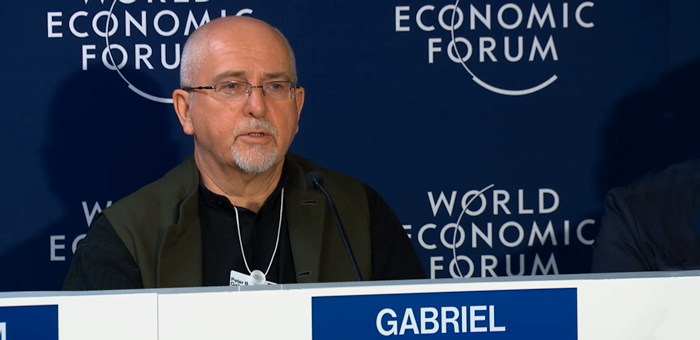WITNESS Attends the World Economic Forum to Discuss the Role of Human Rights in Technology
At the World Economic Forum 2015 in Switzerland, WITNESS’ co-founder, Peter Gabriel, was asked why ‘the data revolution’ is an issue close to his heart. Here’s what he said:
I think the data revolution is as important as the Internet revolution… it’s going to be of huge importance, who owns and controls data. There will be data wars coming. And yet what is this stuff that they’re calling the new oil? Besides being very powerful for business, it has enormous potential for people because what it allows is to make the world visible.
Mr. Gabriel then passed the baton to our Program Director, Sam Gregory, to explain how WITNESS is working to advocate for human rights values in technology:
At WITNESS, we focus on the power of individuals with camera phones in their pockets and how the data those phones create, which is that complex combination of photos and videos and Internet and metadata is used to create change.
For us the first principle, pushes the power to the individual to make the choice about the data that they share and its usage as much as possible.
An example of the work is very directly in the human rights context for us, we push for companies to integrate a proof mode in their devices that enables people to choose to add data into it that makes it more useful as evidence, more findable, more valuable as a data point, but also to choose sometimes to take data out of purposefully created media because there are great risks to individuals. You can be identified from a single piece of media or an aggregate set of data that you create. It’s the idea of using data for good but recognizing the vulnerabilities of individuals.
In our societies where there is a developed rule of law, as you look at data sets there are risks of discrimination, of new forms of redlining, of ways in which, governments and institutions use aggregate data that discriminate against individuals and groups. The vulnerability of specific people who can be identified in places where there is recrimination against individuals. On Sandy’s point, it’s not about just access to the data and the dataset but not everyone is yet in the dataset, and just making sure that we’re not contributing to inequalities that way.
Finally just to note, again, this emphasis on, on really pushing control and agency and understanding to the individual as much as possible and recognizing the risks of these datasets. If we want them to have real value, we might need to have value over many years and over contexts that are not just a single incident. For us, it seems tremendously important right now, that we grapple with what big data can be through a human rights lens.
The video below is the full panel discussion with questions and answers from the onsite audience:
Having trouble viewing video? Click here
Learn more about WITNESS’ 2015 technology advocacy goals on our blog.

